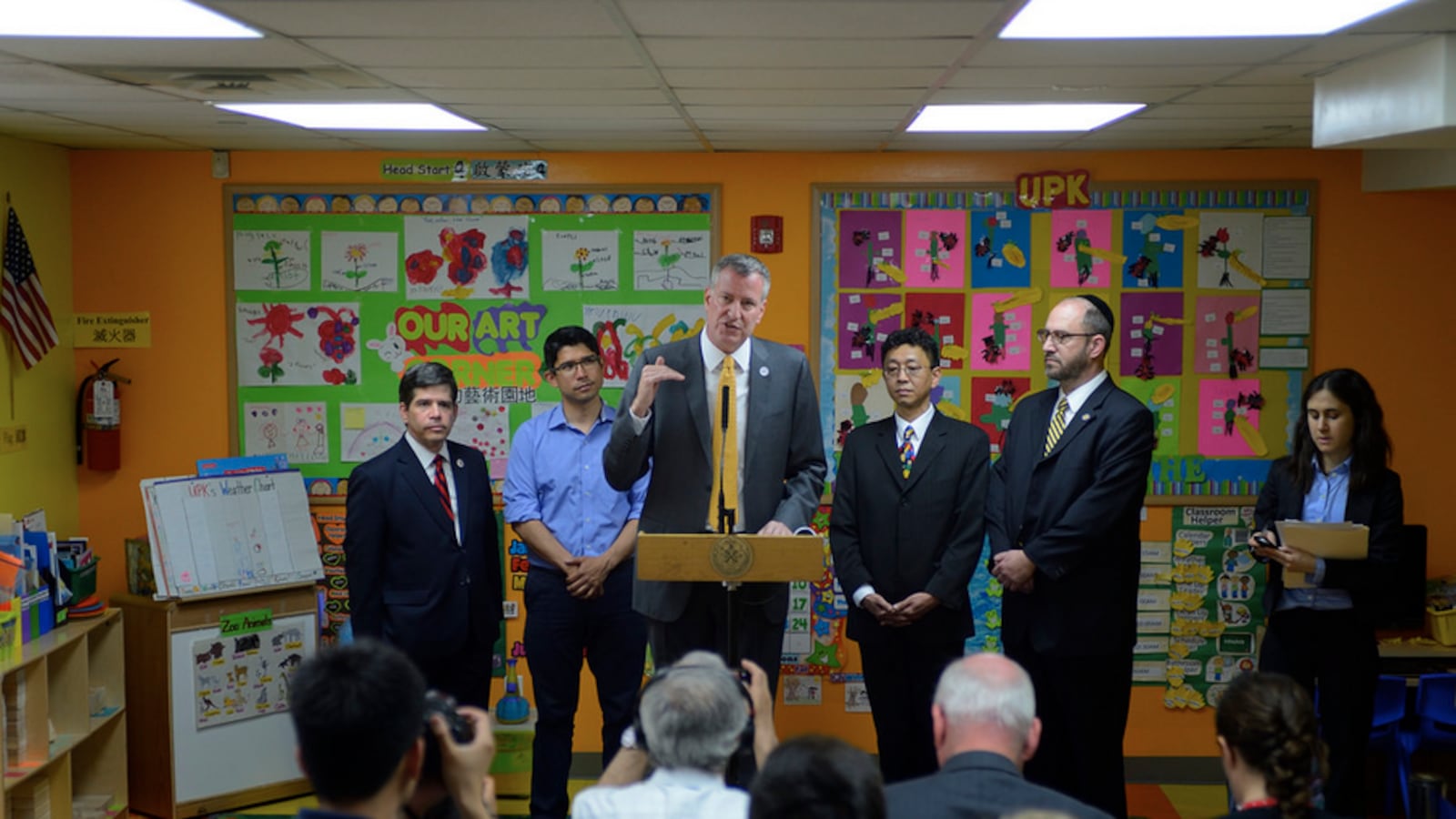Updated on 5:28 p.m. After a short delay, some deadline extensions, and considerable anxiety, the first batch of charter schools have applied to help get Mayor Bill de Blasio’s signature pre-kindergarten program off the ground.
Eleven charter schools are vying to open pre-K programs that would serve 324 students in the fall, city officials said this week, and another six wrote letters of intent to apply next year. The applicants represent less than 10 percent of all charter schools, and none of the city’s best-known charter management organizations applied.
The relatively low level of response was expected, since charter schools faced tight deadlines to submit applications and don’t have complete answers to a number of important logistical questions. Charter school leaders who did apply said they were taking a leap of faith, since they still aren’t sure whether they need extra approval from their authorizers and whether their schools will receive facilities funding.
Gina Sardi, head of the New York City Montessori Charter School, said her school’s model of mixing age groups would make it easier to integrate four-year-olds into the school. But she still wasn’t sure how much she will be reimbursed for renting the additional floor the school will need to accommodate the pre-K program in its privately-owned Bronx building.
“I won’t sign anything until they commit to giving some facilities funds,” said Sardi, who applied to provide 52 pre-K seats.
This is the first time most charter schools are facing these questions because they have historically been prohibited from accessing state funds to operate pre-K. As a result, separate boards had to be set up to start a pre-K program, and students weren’t guaranteed spots in the schools’ kindergarten classes—barriers that many school leaders said kept them from serving younger students.
This year, state lawmakers eliminated some of those roadblocks, and charter schools have access to some of the $300 million that’s been allotted to New York City as part of de Blasio’s ambitious push to provide 53,000 full-day pre-K seats seats by September. All but one of this year’s applicants, New York Foundling, which operates Mott Haven Academy, are taking advantage of a new law that allows charter schools to directly tap into state funds. (The Department of Education is recommending that Foundling’s program be approved by the Panel for Educational Policy)
Charter advocates have emphasized early education in the their lobbying efforts in Albany in recent years and advisors to Gov. Andrew Cuomo have said the schools offer “untapped potential” in pre-K expansion efforts.
De Blasio was initially hesitant to embrace charter schools as part of his pre-K plans. In January, he cited models like Harlem Children’s Zone, which provide pre-K through community-based organizations, as examples of why state law didn’t need to be changed.
The de Blasio administration soon warmed to the idea of making it easier for charters to operate pre-K programs, a spokesman said, lobbying lawmakers to change state law to allows them direct access to state funds.
Making that happen months after other public schools submitted applications proved complicated. At a meeting with charter leaders last month, city officials revealed that schools would have about two weeks to apply for the program, although that timeline was pushed back twice after the application’s release was delayed.
The city is reviewing schools now and plans to pick which ones will be recommended to operate pre-K programs in early June. The city’s application will then need to be approved by the State Education Department.
For now, it’s unclear whether charter schools need to revise their charters, an additional process that could prevent schools from applying in the future. City officials have also told applicants to include facilities costs in their proposed budgets, but final spending plans will need to be negotiated between both sides.
Most of the charter schools that have applied to open pre-K programs in the fall operate in private space, since schools co-located in public space generally aren’t given any extra space. An exception is Renaissance Charter school in Queens, one of the city’s oldest charter schools, which operates in a public building. Principal Stacey Gauthier said she was able to free up a classroom for pre-K by reconfiguring class schedules in Renaissance’s high school grades.
Another thing that many of the charters have in common is that they are part of a coalition that has distanced itself from the larger charter operators and met regularly with the de Blasio administration. Among the schools that submitted letters of intent to apply next year was Teaching Firms of America, where one of the coalition’s spokesmen, Rafiq Kalad Id-Din, is a founder and teacher leader.
Despite the remaining uncertainty, some leaders said they were just eager to start serving students at a younger age. Hellenic Charter School Principal Christina Tettonis, who applied for 18 seats, said she was confident that that benefits to students would outweigh any implementation challenges.
“We’re hoping for the best,” Tettonis said.
And New York City Charter Center CEO James Merriman said that the number of applications for programs to open this fall didn’t tell the whole story.
The charter pre-K program “has had a great start given the tight timeline and the facility challenges that schools face,” Merriman said in statement, “and I am certain that number of participants will grow rapidly next year.”
Don’t miss the latest in New York City education news: sign up for our morning newsletter here.

